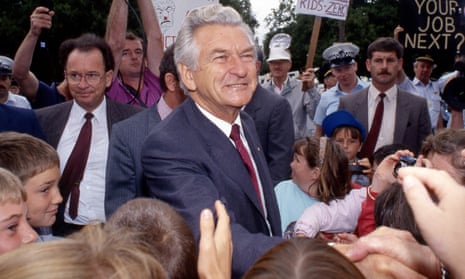He spoke like us. Hawke. That was the distinction.
People forget that the accent we have, common Australian in its broader variation, wasn’t the language of power here – until Bob made it so.
At the time he was elected, in 1983, the way the Australian media spoke was aggressively unadorned by the vernacular. Institutional power in 1983 rounded its vowels like Hawke’s Liberal opponent Malcolm Fraser in the accent known as “cultivated Australian”.
That sound signposted the British ruling class, private education and wealth, things largely unimaginable to those of us whose speech was peppered with “Yeah” or “nuh” and knew that “bloody” was a swear word, but found it slipped out anyway. People like us – families like mine – used to only hear our voices dominate places power did not attend; neighbourhoods, sporting games, state schools, union meetings, pubs and the RSL. On the TV that we watched, working class people were mostly comic rubes – mocked, for our own entertainment. Whatever Labor leaders Curtin or Chifley had sounded like was distant, not televised and near forgotten. Gough, who hailed from Kew, sounded his presence with a middle-class bellow.
And then came Bob. The rise of the preacher’s son through the ranks of the ACTU came at the time news media was teaching itself its new technologies of coverage and live broadcast. Union organising teaches communication “on the stump” – speeches to members that are simultaneously motivational sermon, political lesson and pastoral chat. Hawke had a legendary talent for it. The format matches the public to what’s personal and it rendered him a dynamite mass communicator on the intimate screen of a TV. His people knew him before they’d ever met. He was Labor’s leader long before he got the job.
It terrified all Tories.
I was eight in 1983. Before the election, my friend Amanda’s mother told me that if Bob Hawke was elected, all old people would be taken to camps and murdered, “just like they did in Russia”. Including my nanna! I ran home, breathless with horror, begging my parents to not vote for him. They laughed. This was the time of “reds under the beds”, Fraser’s last-ditch cold war scare campaign. My parents made me watch the news that night. “Now,” Mum pointed at Hawke, “does that sound like someone who’d kill your nanna?”
No. He was as familiar as the men who placed bets and gambled in the TABs and RSLs where my parents worked, or an uncle at a family barbecue – the kind of old friend my parents might run into at the racetrack, or in rooms with the smell of ashtrays, the crust of foam left in a beer glass, Brylcreem combed through hair.
Again, people forget that something as ubiquitous as beer was once a demarcation of class in this country. Those trying to comprehend the grief that has swallowed a political generation since the news of Hawke’s death broke need to remember that he was the man who showed you could speak like us and live like us – love sport, love beer, go to the track, be union to your core … indulge, indeed, all those habits of the working class the bourgeois classes found so vulgar and yet still become a Rhodes scholar, if you had brains enough. You could still become prime minister.
His political appeal wasn’t just that he was a poster boy for working class aspiration. It was that he maintained a commitment over the course of his entire political life to giving other working class people the material opportunity for themselves – and their children – to aspire. He had seen the worst excesses of exploitation in the workplace as a unionist and he knew that working class aspiration is only ever made possible through a collective effort. Hawke’s collective frameworks were unionism, labourism and the Labor party.
There are many political criticisms of Hawke that have and will be written, I have myself written a few. But the writer Christian Read I believe encapsulated Hawke’s legacy in this period of mourning when he posted a photograph of a Medicare card on social media today. Read wrote:
This is a sign that you participate, economically, in one of the most robust, effective, and envied medical systems on earth. It is funded by taxes on citizens and business. And it is a symbol.
A symbol that each Australian’s health matters. And that we recognise this tie to one another. That we pool together, as a nation, to help one another out. The card is a promise that you will be cared for in your darkest times. A basic act of compassion. Bob Hawke gave us that.
The post resonated with a memory of Hawke speaking at a union event I attended a couple of years ago.
Two young bucks from the movement were selected to assist the old man – the great man, their visionary and hero – with the stairs. His mobility wasn’t good. One of the young men demurred to touch him, was too gentle, blushed, stumbled and kept apologising.
Bob Hawke was a leader “essentially unchanged by office”, and he always spoke like us. “Don’t fuck around, son,” he told the young man, “just help me up the stage.”

